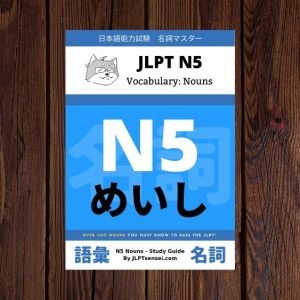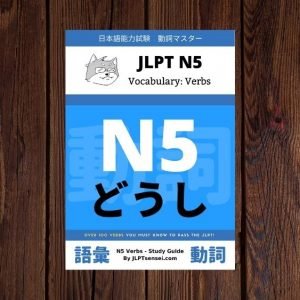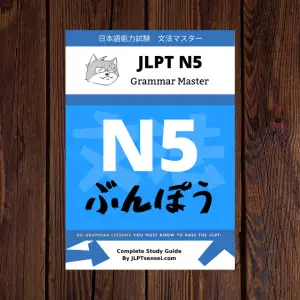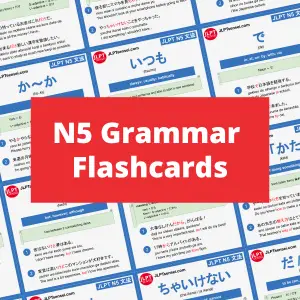
This is a list of the vocabulary that you need to know in order to pass the JLPT N5. In total, you will need to have a vocabulary of about 800 words.
This list includes lessons for the most common and important words for you to know, all listed in alphabetical order.
See our full study guide for how to pass the JLPT N5.
- See all JLPT N5 nouns
- Sell all JLPT N5 verbs
- Sell all JLPT N5 adverbs
- See all JLPT N5 adjectives
- See all JLPT N5 pre-noun adjectivals
- See all JLPT N5 particles
- See all JLPT N5 katakana words
Bonus downloads for our members on Patreon:
- All Ebooks and printable PDF lists (grammar, vocab, kanji, etc).
- Flashcards & more! (see all benefits)
| # | ごい | Vocabulary | Type | Meaning |
|---|---|---|---|---|
| 1 | 浴びる | abiru あびる | Verb, Ichidan verb, Transitive verb | to bathe, to shower |
| 2 | 危ない | abunai あぶない | Adjective, い-adjective | dangerous |
| 3 | あっち | acchi | Pronoun | over there |
| 4 | あちら | achira | Pronoun | there |
| 5 | 上げる | ageru あげる | Verb, Ichidan verb, Transitive verb | to raise; to elevate; to give |
| 6 | 赤 | aka あか | Noun | red; crimson; scarlet |
| 7 | 赤い | akai あかい | Adjective, い-adjective | red; crimson; scarlet |
| 8 | 明るい | akarui あかるい | Adjective, い-adjective | bright; light |
| 9 | 開ける | akeru あける | Verb, Ichidan verb, Transitive verb | to open (a door, etc.); to unwrap (e.g. parcel, package); to unlock |
| 10 | 秋 | aki あき | Noun | autumn; fall |
| 11 | 開く | aku あく | Verb, Godan verb, Intransitive verb | to open (e.g. doors, business, etc) |
| 12 | 甘い | amai あまい | Adjective, い-adjective | sweet; sweet-tasting; sugary; naive; indulgent |
| 13 | 雨 | ame あめ | Noun | rain |
| 14 | 飴 | ame あめ | Noun | candy |
| 15 | あなた | anata | Pronoun | you |
| 16 | 姉 | ane あね | Noun | older sister; elder sister |
| 17 | 兄 | ani あに | Noun | elder brother; older brother |
| 18 | あの | ano | Pre-noun adjectival | that |
| 19 | 青 | ao あお | Noun | blue; azure |
| 20 | 青い | aoi あおい | Adjective, い-adjective | blue; azure |
| 21 | アパート | apaato | Noun, Katakana | apartment |
| 22 | 洗う | arau あらう | Verb, Godan verb, Transitive verb | to wash |
| 23 | あれ | are | Pronoun | that |
| 24 | ある | aru | Verb, Godan verb, Intransitive verb | to be, to have |
| 25 | 歩く | aruku あるく | Verb, Godan verb, Intransitive verb | to walk |
| 26 | 朝 | asa あさ | Noun | morning |
| 27 | 朝ご飯 | asagohan あさごはん | Noun | breakfast |
| 28 | 明後日 | asatte あさって | Noun | day after tomorrow |
| 29 | 足 | ashi あし | Noun | foot; leg; paw; arm |
| 30 | 明日 | ashita あした | Noun, Temporal noun | tomorrow |
| 31 | 遊ぶ | asobu あそぶ | Verb, Godan verb, Intransitive verb | to play; to enjoy oneself |
| 32 | あそこ | asoko | Pronoun | over there |
| 33 | 頭 | atama あたま | Noun | head |
| 34 | 新しい | atarashii あたらしい | Adjective, い-adjective | new; novel; fresh; recent; latest |
| 35 | 暖かい | atatakai あたたかい | Adjective, い-adjective | warm |
| 36 | 後 | ato あと | Noun | behind; after; remainder; left; also |
| 37 | 暑い | atsui あつい | Adjective, い-adjective | hot; sultry |
| 38 | 厚い | atsui あつい | Adjective, い-adjective | thick |
| 39 | 熱い | atsui あつい | Adjective, い-adjective | hot |
| 40 | 会う | au あう | Verb, Godan verb, Intransitive verb | to meet; to encounter; to see |
| 41 | 晩ご飯 | bangohan ばんごはん | Noun | dinner; evening meal |
| 42 | 番号 | bangou ばんごう | Noun | number |
| 43 | バス | basu | Noun, Katakana | bus |
| 44 | バター | bataa | Noun, Katakana | butter |
| 45 | ベッド | beddo | Noun, Katakana | bed |
| 46 | 勉強 | benkyou べんきょう | Noun, Suru verb | to study |
| 47 | 便利 | benri べんり | な-adjective | convenient; handy; useful |
| 48 | ボールペン | boorupen | Noun, Katakana | ball-point pen |
| 49 | ボタン | botan | Noun, Katakana | button |
| 50 | 帽子 | boushi ぼうし | Noun | hat; cap |
| 51 | 文章 | bunshou ぶんしょう | Noun | sentence |
| 52 | 豚肉 | butaniku ぶたにく | Noun | pork |
| 53 | 病院 | byouin びょういん | Noun | hospital |
| 54 | 病気 | byouki びょうき | Noun | illness; disease; sickness |
| 55 | 茶色 | chairo ちゃいろ | Noun | brown |
| 56 | 茶碗 | chawan ちゃわん | Noun | rice bowl; tea cup; teacup |
| 57 | 父 | chichi ちち | Noun | father |
| 58 | 違う | chigau ちがう | Verb, Godan verb, Intransitive verb | to differ |
| 59 | 小さい | chiisai ちいさい | Adjective, い-adjective | small; little; tiny |
| 60 | 小さな | chiisana ちいさな | Pre-noun adjectival | small; little; tiny |
| 61 | 近い | chikai ちかい | い-adjective | near; close |
| 62 | 地下鉄 | chikatetsu ちかてつ | Noun | subway; underground train |
| 63 | 地図 | chizu ちず | Noun | map |
| 64 | ちょっと | chotto | Adverb | a little |
| 65 | 丁度 | choudo ちょうど | Adverb | exactly |
| 66 | 台所 | daidokoro だいどころ | Noun | kitchen |
| 67 | 大学 | daigaku だいがく | Noun | university; college |
| 68 | 大丈夫 | daijoubu だいじょうぶ | Adjective, な-adjective, Adverb | OK; okay; alright; problem free |
| 69 | 大好き | daisuki だいすき | Adjective, な-adjective | love; like; like very much |
| 70 | だんだん | dandan | Adverb | gradually |
| 71 | 誰 | dare だれ | Pronoun | who |
| 72 | 誰か | dareka だれか | Pronoun | someone; somebody |
| 73 | 出す | dasu だす | Verb, Godan verb, Transitive verb | to take out; to get out; to put out; to reveal |
| 74 | 出口 | deguchi でぐち | Noun | exit; gateway; way out |
| 75 | 出かける | dekakeru でかける | Verb, Ichidan verb, Intransitive verb | to go out; to leave; to depart |
| 76 | 電気 | denki でんき | Noun | electricity |
| 77 | 電車 | densha でんしゃ | Noun | train; electric train |
| 78 | 電話 | denwa でんわ | Noun, Verb, Suru verb | telephone (call / device)l; phone call |
| 79 | デパート | depaato | Noun, Katakana | department store |
| 80 | 出る | deru でる | Verb, Ichidan verb, Intransitive verb | to leave; to exit; to appear; to go out |
| 81 | ドア | doa | Noun, Katakana | door |
| 82 | どっち | docchi | Pronoun | which; which one |
| 83 | どちら | dochira | Pronoun | which of two |
| 84 | どこ | doko | Pronoun | where; what place |
| 85 | どなた | donata | Noun | who |
| 86 | どの | dono | Pre-noun adjectival | which |
| 87 | どれ | dore | Pronoun | which (of three or more) |
| 88 | どう | dou | Adverb | how; in what way; how about |
| 89 | 動物 | doubutsu どうぶつ | Noun | animal |
| 90 | どうも | doumo | Adverb | thank you; thanks |
| 91 | どうぞ | douzo | Adverb | please |
| 92 | 土曜日 | doyoubi どようび | Noun | Saturday |
| 93 | 絵 | e え | Noun | picture |
| 94 | ええ | ee | Noun | yes; that is correct; right |
| 95 | 映画 | eiga えいが | Noun | movie; film |
| 96 | 映画館 | eigakan えいがかん | Noun | movie theater; cinema |
| 97 | 英語 | eigo えいご | Noun | English language |
| 98 | 駅 | eki えき | Noun | station |
| 99 | 鉛筆 | enpitsu えんぴつ | Noun | pencil |
| 100 | エレベーター | erebeetaa | Noun, Katakana | elevator |
JLPT N5 vocab List total: (644)
Currently viewing page 1 of 7
JLPT N5 Study Guide
JLPT N5 Grammar Master [e-book]
Complete Study Guide
This e-book includes every grammar point you need to know in order to pass the JLPT N5, with detailed usage notes and numerous example sentences.
Pages: 192
N5 Grammar Flashcards
Full Batch Download
Download link includes:
- Print-ready PDF of square flashcards with cut-out guides (see preview)
- Full set of high quality .png image flashcards
- JLPT N5 Grammar 文法 square size (80 images)
- JLPT N5 Grammar 文法 rectangle size (80 images)
*NOTE* Officially, there are no kanji, vocabulary, or grammar lists for the JLPT. As a result, it is not possible to be certain which kanji, words, or grammar will or will not appear in a given test. Our study lists are based on prior test data and comparisons with other available lists of JLPT kanji, vocabulary, grammar, etc.



